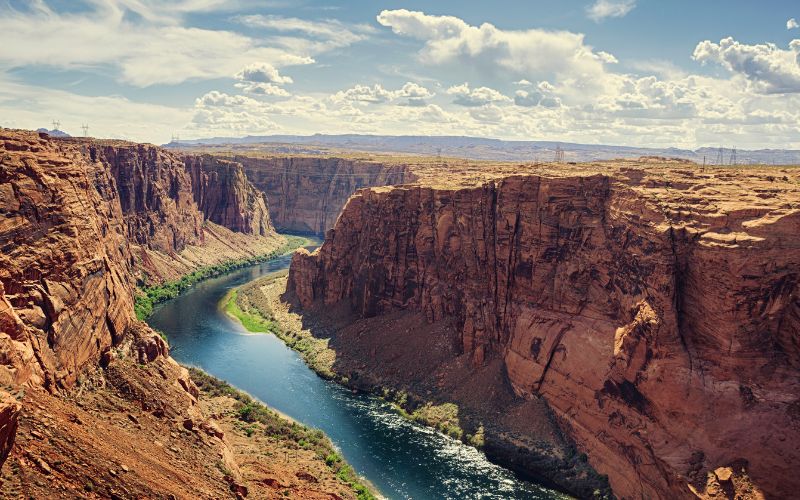
- Details
- By Kaili Berg
The Department of Interior announced a $327 million investment to continue fulfilling settlements of Indian water rights claims. The funding will support major water projects across the West to secure reliable water supplies for Tribes.
The funding comes from the Bipartisan Infrastructure Law and the Reclamation Water Settlements Fund through President Biden’s Investing in America agenda.
"Through the President’s Investing in America agenda, the Interior Department is continuing to uphold our trust responsibilities and ensure that Tribal communities receive the water resources they have long been promised,” Secretary Deb Haaland said in a press release.
Prior to the signing of the Bipartisan Infrastructure Law, many Indian Water Rights settlements remained underfunded. Tribes across the country have been challenged by centuries of colonization and resource exploitation, resulting in large cities siphoning water from their reservations.
“Reliable water is crucial to ensuring the health, safety and empowerment of Indigenous communities. I am grateful that Tribes, some of whom have been waiting for this funding for decades, are finally getting the resources they are owed,” Haaland said.
More than $100 million will go towards the Navajo-Gallup Water Supply project in New Mexico, a major infrastructure project that will provide reliable water supply from the San Juan River to the Navajo Nation via pipeline. The water supply will meet the future population needs of approximately 250,000 people.
The Navajo Nation has for years been locked in contentious negotiations with the state of Arizona to secure water from the Colorado River Basin, which provides water for 30 million people. In June, the US Supreme Court ruled against the tribe in Arizona v. Navajo Nation, determining that the federal government is not obligated to help the Navajo Nation access water from the Colorado River. The court's decision arrived during the Colorado River Basin’s worst drought in 1,200 years.
Approximately 30 percent of homes in the Navajo Nation lack running water and must drive for miles to refill barrels and jugs for drinking, cooking, and bathing. The lack of domestic water supply also impedes the economic development of the Tribe.
For the 2024 fiscal year, the following settlements and projects will get funds:
- Navajo-Gallup Water Supply Project ($164,000,000)
- Aamodt Litigation Settlement ($69,100,000)
- Blackfeet Water Rights Settlement ($35,790,000)
- Ak-Chin Indian Water Community Rights Act ($22,500,000)
- Crow Tribe Water Rights Settlement ($12,772,000)
- Southern Arizona Water Rights Settlement – Farm Extension ($9,000,000)
- Nez Perce Settlement ($6,100,000)
- Animas-La Plata Project (Colorado Ute) ($3,400,000)
- Navajo-Gallup O&M ($2,000,000)
- San Carlos Apache Tribe – Distribution System ($1,500,000)
- San Carlos Irrigation Project Rehab ($400,000)
More Stories Like This
Native News Weekly (August 25, 2024): D.C. BriefsNavajo Nation Mourns the Passing of Former Vice President Rex Lee Jim
Deb Haaland Earns Endorsement From Communications Workers of America Local 7076
University Soccer Standout Leads by Example
Two Native Americans Named to Democratic Congressional Campaign Committee's“Red to Blue” Program
Help us defend tribal sovereignty.
At Native News Online, our mission is rooted in telling the stories that strengthen sovereignty and uplift Indigenous voices — not just at year’s end, but every single day.
Because of your generosity last year, we were able to keep our reporters on the ground in tribal communities, at national gatherings and in the halls of Congress — covering the issues that matter most to Indian Country: sovereignty, culture, education, health and economic opportunity.
That support sustained us through a tough year in 2025. Now, as we look to the year ahead, we need your help right now to ensure warrior journalism remains strong — reporting that defends tribal sovereignty, amplifies Native truth, and holds power accountable.
 The stakes couldn't be higher. Your support keeps Native voices heard, Native stories told and Native sovereignty defended.
The stakes couldn't be higher. Your support keeps Native voices heard, Native stories told and Native sovereignty defended.
Stand with Warrior Journalism today.
Levi Rickert (Potawatomi), Editor & Publisher


